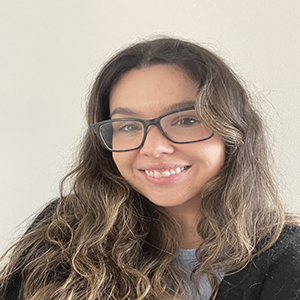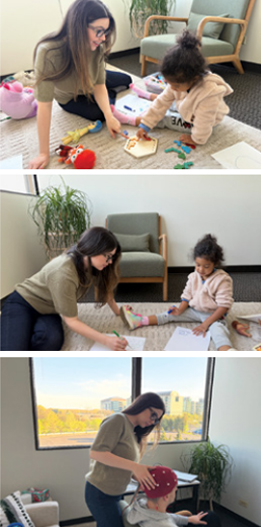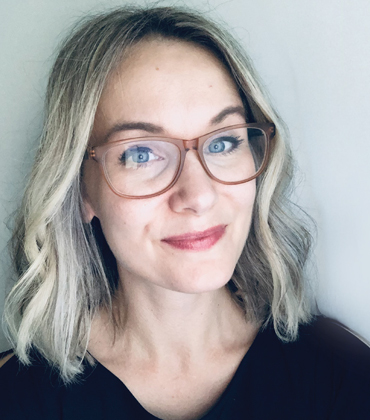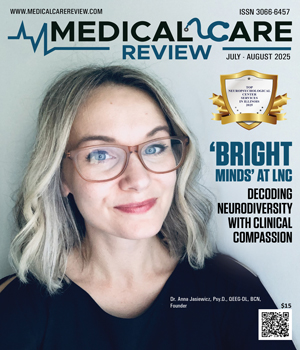By the time most families reach out to ‘Bright Minds’ at LNC, they’ve already tried everything else; tutors, therapists, behavioral charts, specialized schools, endless googling. They’ve followed every piece of conventional advice, implemented structure, and attempted to “fix” their child. But nothing explained why their gifted, creative child, who could build entire worlds with LEGOs, couldn’t sit still during class and had meltdowns over homework.
What if the problem wasn’t the child? What if it was the system?
 Sara Gosic, Therapist and Director of Training in Psychometrics
Sara Gosic, Therapist and Director of Training in Psychometrics
“I call them brain styles and neurotypes, not disorders,” says Founder Dr. Anna Jasiewicz, Psy.D., QEEG-DL, BCN. “We see neurodivergence as part of one’s identity with the goal of not inherently changing who people are, but rather addressing any challenges and barriers that arise from being neurodivergent.”
We are encouraging acceptance, providing personalized supports and strategies, and helping recognize that neurodivergence is valuable—and it comes with its own set of strengths that can be fostered and used constructively
“Every individual is unique,” says Dr. Jasiewicz. We make sure that uniqueness is acknowledged and embraced with curiosity, compassion and the kind of tailored support that truly changes lives.
Discovering the Human Behind the Behavior
Making people feel comfortable in their own skin is the first step toward success. ‘Bright Minds’ at LNC champions it. Known for its neuropsychological evaluations, the clinic transforms assessment into a therapeutic intervention, where each test prioritizes a people-first perspective over a narrow focus on Diagnostic and Statistical Manual of Mental Disorders labels.
It all starts with a testing environment specifically designed to meet the sensory and emotional needs of neurodivergent individuals. The room isn’t defined by harsh lighting, strong fragrances or overwhelming stimuli, encouraging individuals to talk more freely about their passionate interests and hobbies.
-
I call them brain styles and neurotypes, not disorders. We see neurodivergence as part of one’s identity with the goal of not inherently changing who people are, but rather addressing any challenges and barriers that arise from being neurodivergent
“We create a space that aligns to the clients nervous system in order to gather the most rich and accurate data of their abilities and who they are as a person” says Dr. Jasiewicz.
A nuanced understanding of neurodivergence helps the clinical team identify less common and less stereotypical presentations that often go unnoticed in more conventional settings. The therapists are also skilled in assessing Pathological Demand Avoidance (PDA) and recognizing high-masking autism profiles, which are frequently overlooked due to the adaptive, outward behaviors neurodivergent individuals develop. They also offer assessments for acquired neurodivergence, such as trauma-induced ADHD, which may not emerge until adulthood. Such breadth of expertise ensures that clients who have often been overlooked or misdiagnosed elsewhere finally receive a comprehensive understanding of their neurological profiles.
Capturing the full spectrum of a person’s capabilities puts an end to the practice of attempting to correct ‘deficits’ or ‘fix people.’
“We understand that our language profoundly shapes how individuals—especially children, view themselves. That’s why you will never see words like “disorder” in our reports,” says Dr. Jasiewicz.
For instance, if someone doesn’t make direct eye contact, instead of being told, “That’s a problem,” the clinic recognizes that for some neurodivergent individuals they attend to, learn, think, and socially connect with more ease when eye contact is not forced. Avoiding eye contact can reduce their sensory overload and anxiety, and may indicate the use of alternative neural pathways for learning and processing social information.
Instead of pathologizing this behavior, the clinic views it as an adaptive communication style intrinsic to the individual’s neurobiology.
Takes One to Know One
 Since ‘Bright Minds’ at LNC is composed entirely of neurodivergent providers and staff, their similar experiences foster profound empathy and appreciation for others who are neurodivergent.
Since ‘Bright Minds’ at LNC is composed entirely of neurodivergent providers and staff, their similar experiences foster profound empathy and appreciation for others who are neurodivergent.
“When every clinician has navigated the same challenges that their clients face, the therapeutic relationship is transformed,” states Sara Gosic, therapist and director of training in psychometrics. “It is not a matter of applying textbook techniques. It’s about sharing a common journey, understanding the masking behaviors and lightening the emotional weight of misdiagnosis.”
Beyond therapy and assessment, the team offers a range of adjunctive therapy approaches, including innovative neurotherapy, which directly enhance neural pathways involved in emotional regulation, attention, sensory processing and cognitive flexibility.
Cutting-edge quantitative electroencephalogram, known as brain mapping, is incorporated as well. This innovative tool analyzes brainwave activity, moving past surface-level behaviors and symptoms to deliver precise knowledge of each client’s neurocognitive profile. Two ADHD individuals, for example, might share the same diagnostic label, but brain mapping reveals the nuances that dictate different treatment modalities, this includes medication selection also known as stratified psychiatry. It proves once again that labels belong in jars, not on people. The reports prove invaluable for educators, pediatricians and psychiatrists who work with clients in various settings, whether that means designing classroom accommodations, adjusting medication schedules or developing personalized therapy plans.
“Brain Mapping helps us move beyond assumptions and diagnoses. It lets us understand the unique wiring of each individual so we can support them with clarity and intention. Brain mapping helps us listen,” states Gosic.
Clients leave these sessions with a newfound idea of themselves; having a quantitative understanding of their neurotype- but more importantly, a roadmap for personalized treatment options.
Breaking the Cycle of Misdiagnosis
-7.jpg) Diagnostic clarity is particularly impactful for women, who are often skilled at masking their neurodivergent traits to meet the societal expectations. Women frequently fall through the cracks, as traditional evaluations often miss their subtle signs, mistaking deeply felt stress, sensory overstimulation, and their need to spend more time alone as being anxious and depressed.
Diagnostic clarity is particularly impactful for women, who are often skilled at masking their neurodivergent traits to meet the societal expectations. Women frequently fall through the cracks, as traditional evaluations often miss their subtle signs, mistaking deeply felt stress, sensory overstimulation, and their need to spend more time alone as being anxious and depressed.
Through integrated neurodevelopmental care, ‘Bright Minds’ at LNC provides the clarity that many have long sought.
When clients receive feedback that confirms their neurodivergence, the relief is palpable. This affirmation validates women’s everyday struggles while opening the door to more personalized services, allowing them to finally be seen for who they truly are.
At ‘Bright Minds’ at LNC, insights gained are further converted into practical strategies that enrich clients’ everyday lives. Focusing on meaningful occupations, the clinic ensures every client understands and fully celebrates their neurodivergent profile.
“Whether mastering daily living, refining executive function or simply enjoying a favorite pastime, every step of the journey is designed to uplift,” says Sara Gosic.
Dynamic Programs for Every Brain
Recognizing that no two brains are alike, ‘Bright Minds’ at LNC has expanded its service portfolio to integrate occupational therapy, talk therapy and neurotherapy in a way that feels more like a dynamic wellness plan than a checklist of treatments.
Building on this foundation, its pediatric therapy service embraces a holistic approach to neurodevelopment. The therapists blend physical and mental activities to enhance young children’s brain organization and function, supporting the development of emotional regulation, executive functions, working memory and sensory processing.
‘Bright Minds’ at LNC distinguishes itself further by offering complementary therapy approaches such as neurotherapy and biofeedback that cater to trauma survivors and individuals who prefer or require alternatives to medication.
“We cannot just talk our way out of trauma; healing trauma means healing the nervous system,” says Dr. Jasiewicz.
Whether clients aim to enhance the effectiveness of their medication or choose to take a completely non-pharmacological path, these services complement their care plans while promoting a more holistic and responsive approach to mental health.
The clinic is also pioneering neurodivergent support groups—including parenting support circles and workshops— to create a collaborative community. These spaces go beyond basic guidance, offering families and professionals a shared journey into understanding brain function, behavior and the lived experiences of neurodivergent individuals.
These initiatives represent a fundamental shift in how neurodevelopmental challenges are treated worldwide.
Building a Neuro-Inclusive World
-6.jpg) “By blending science, empathy and lived experience, we are building a world where neurodivergent individuals no longer have to be forced to mold to neurotypical standards and expectations,” says Dr. Jasiewicz. “Instead, we are encouraging acceptance, providing personalized supports and strategies, and helping recognize that neurodivergence is valuable—and it comes with its own set of strengths that can be fostered and used constructively.”
“By blending science, empathy and lived experience, we are building a world where neurodivergent individuals no longer have to be forced to mold to neurotypical standards and expectations,” says Dr. Jasiewicz. “Instead, we are encouraging acceptance, providing personalized supports and strategies, and helping recognize that neurodivergence is valuable—and it comes with its own set of strengths that can be fostered and used constructively.”
At ‘Bright Minds’ at LNC, this philosophy reigns supreme. As a neurodiversity-affirming and trauma-informed practice, the clinic champions creative modalities such as movement, stimming, art, music, bodywork, neurotherapy, meditation and more—each serving as a path to healing. With a deep understanding of trauma’s effects on the brain and body, ‘Bright Minds’ at LNC integrates somatic and adjunctive mind-body therapies to build resilience and promote healthy recovery.
“Healing as a neurodivergent adult often means grieving who the world wants you to be, and learning to love who you actually are,” Gosic states.
Truly embracing the art of uncovering the person behind the behavior, ‘Bright Minds’ at LNC has created a place where deep insight and acceptance take center stage; a place that finally sees each individual for the incredible work of art they are.
‘Bright Minds’ at LNC
Dr. Anna Jasiewicz, Psy.D., QEEG-DL, BCN, FounderSara Gosic, Therapist and Director of Training in Psychometrics
Thank you for Subscribing to Medical Care Review Weekly Brief





